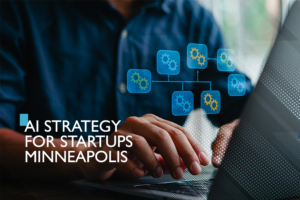AI Strategy for Startups Minneapolis
Building Competitive Advantage in Minnesota’s Growing Tech Scene
Years in Business
Completed Projects
AI strategy for startups Minneapolis has become essential for securing venture capital and scaling operations in Minnesota’s rapidly evolving tech ecosystem.
With $1.47 billion in annual venture capital flowing through the Twin Cities and strong support from organizations like Forge North, startups that develop comprehensive artificial intelligence strategies position themselves for accelerated growth and increased funding opportunities.
Minnesota’s startup community faces unique challenges including talent competition with established Fortune 500 companies and harsh winter weather that can impact operations.
However, smart AI implementation helps startups overcome these regional obstacles while building sustainable competitive advantages that attract both customers and investors.

Minnesota’s startup ecosystem benefits from lower operational costs compared to Silicon Valley while maintaining access to top-tier talent from the University of Minnesota and surrounding institutions. Startups that Minnesota startup automation strategies early often achieve 25-40% cost reductions while improving service delivery. This operational efficiency becomes particularly attractive to investors seeking sustainable growth models rather than pure growth-at-any-cost approaches.
Current funding rounds for AI startups consistently exceed traditional technology companies by 150-200% at every stage. Pre-seed AI companies raise $500,000 to $2 million compared to $250,000 to $1 million for non-AI startups. Series A rounds for AI companies average $15-25 million versus $8-12 million for traditional tech startups. These elevated funding levels reflect investor confidence in AI’s transformative potential across industries.
Local investors and venture capital firms are increasingly prioritizing startups with clear AI integration plans. Minnesota-based funds like Arthur Ventures and Brightstone Venture Capital actively seek portfolio companies that demonstrate strategic AI adoption rather than superficial implementation. This regional focus creates opportunities for startups that develop authentic AI capabilities aligned with business objectives.
Successful AI implementation for startups requires strategic focus on specific business problems rather than general technology adoption. Investors evaluate AI strategies based on measurable impact potential, scalability, and defensibility. Startups that begin with clearly defined use cases and demonstrate early wins build credibility for larger AI initiatives.
Data quality and accessibility represent foundational requirements for effective AI implementation. Minnesota startups often possess significant data advantages due to established customer relationships and operational history. However, raw data alone doesn’t create value—startups must invest in data cleaning, organization, and governance before implementing AI solutions. This preparation phase typically requires 2-4 months but dramatically improves AI effectiveness.
Technical talent acquisition remains challenging in Minneapolis, with competition from Target, Best Buy, 3M, and other major employers. AI automation Minneapolis strategies help startups maximize existing team productivity while building AI capabilities incrementally. Many successful startups partner with local universities or outsource initial AI development to proven consultants.
Investors particularly value AI strategies that create network effects or compound data advantages over time. Machine learning models that improve with usage, customer behavior prediction systems, and automated optimization tools all demonstrate this characteristic. Startups should articulate how their AI implementations become more valuable as the business scales, creating natural barriers to competition.
Budget allocation for AI initiatives should balance immediate impact with long-term capability building. Successful Minneapolis startups typically invest 15-25% of development resources in AI projects during early growth phases. This allocation allows for meaningful progress without overwhelming limited resources or distracting from core business operations.
Scaling with AI requires systematic automation of repetitive processes that consume valuable team resources. Minnesota startups commonly automate customer service inquiries, financial reporting, inventory management, and marketing campaign optimization. These implementations free skilled team members to focus on strategic initiatives while improving operational consistency and speed.
Customer acquisition and retention benefit significantly from AI-powered personalization and predictive analytics. Startups implementing recommendation engines, dynamic pricing algorithms, and churn prediction models report 20-35% improvements in key metrics. Minneapolis Web Design recognizes that local market understanding combined with AI capabilities creates powerful competitive advantages for Minnesota startups.
Supply chain optimization through AI becomes particularly valuable during Minnesota’s challenging winter months when transportation and logistics face weather-related disruptions. Predictive analytics help startups anticipate delays, optimize inventory levels, and maintain customer satisfaction despite external challenges. This resilience becomes a significant competitive advantage over startups in more predictable climates.
Financial management and forecasting improve dramatically with AI-assisted analytics and reporting. Startups can identify cash flow patterns, predict seasonal variations, and optimize spending allocation based on data-driven insights. These capabilities prove essential when communicating with investors and board members who expect sophisticated financial planning and risk management.
Quality control and product development cycles accelerate through automated testing, user feedback analysis, and performance monitoring. AI systems can identify potential issues before they impact customers, suggest product improvements based on usage patterns, and optimize feature development priorities. This systematic approach to product management resonates strongly with venture capital firms evaluating long-term scalability potential.
Tech startup automation strategies must align with specific industry requirements and customer expectations. B2B startups typically prioritize lead scoring, sales process automation, and customer success management systems. B2C startups focus on user experience optimization, content personalization, and engagement automation. Understanding these distinctions helps startups allocate AI development resources effectively.

Integration with existing business systems ensures that AI implementations enhance rather than disrupt established workflows. Successful Minneapolis startups typically choose AI solutions that work with current CRM, accounting, and project management systems. This approach minimizes implementation complexity while maximizing adoption rates among team members who may be hesitant about new technology.
Performance monitoring and optimization create continuous improvement cycles that compound AI value over time. Startups should establish clear metrics for AI effectiveness, regular review processes, and adjustment protocols based on results. This systematic approach demonstrates operational maturity that appeals to venture capital firms evaluating management team capabilities.
Competitive intelligence through AI-powered market monitoring helps startups identify opportunities and threats before they become critical. Automated tracking of competitor pricing, product releases, and marketing campaigns enables rapid strategic adjustments. Twin Cities startup technology communities often share insights about effective competitive intelligence tools and strategies.
Venture capital AI investment decisions increasingly focus on startups that demonstrate clear paths to AI-driven growth and competitive advantages. Investors evaluate technical capabilities, market opportunities, team expertise, and scalability potential when assessing AI-focused startups. Minnesota entrepreneurs must present compelling narratives that connect AI capabilities to measurable business outcomes.
Due diligence processes for AI startups involve technical assessments, data quality reviews, and intellectual property evaluations. Startups should prepare comprehensive documentation of their AI systems, training data sources, model performance metrics, and ongoing improvement strategies. This preparation demonstrates professionalism and reduces investor concerns about technical risks.
Timing considerations become critical when seeking AI-focused venture capital investment. The current market enthusiasm for AI creates opportunities but also increases competition among startups seeking funding. Mobile app strategies that incorporate AI features often attract additional investor interest compared to traditional applications.
Team building and technical expertise requirements for AI startups exceed those of traditional technology companies. Investors evaluate founding team backgrounds, advisory relationships, and hiring plans when assessing AI startups. Minneapolis startups benefit from strong relationships with University of Minnesota research programs and access to experienced AI professionals working at local Fortune 500 companies.
Market validation and customer traction provide essential evidence that AI implementations create genuine value rather than impressive demonstrations. Startups should prioritize paying customers, measurable improvements in customer outcomes, and documented case studies over technical achievements alone. This customer-focused approach aligns with investor expectations for sustainable business models.
Risk mitigation strategies address common concerns about AI implementations including data privacy, regulatory compliance, and technical dependencies. Startups that proactively address these issues through legal reviews, security assessments, and contingency planning demonstrate operational maturity that reduces investor risk perceptions. The limited time remaining in 2025 creates urgency for startups seeking to capitalize on current AI investment trends before market conditions potentially shift.
AI startups in Minneapolis typically raise $500,000 to $2 million in pre-seed rounds, $3-8 million in seed rounds, and $15-25 million in Series A funding. These amounts exceed traditional tech startups by 150-200% due to increased investor interest in AI applications. Minnesota’s lower operational costs allow these funding amounts to provide longer runway compared to coastal markets.
Basic AI implementations like chatbots or automated reporting can be deployed within 4-8 weeks. More complex machine learning systems requiring custom model development typically take 3-6 months. Data preparation and team training often add 2-4 months to implementation timelines. Startups should plan for 6-12 month cycles to see meaningful AI-driven business improvements.
Customer service automation, predictive analytics for seasonal businesses, supply chain optimization for weather disruptions, and financial forecasting prove most valuable for Minnesota startups. Healthcare technology, agricultural technology, and manufacturing automation represent particular strengths given the state’s industry concentrations. Local market knowledge combined with AI creates competitive advantages that attract both customers and investors.
Minnesota startups offer competitive total compensation packages including equity, lower cost of living, better work-life balance, and meaningful involvement in company growth. Partnerships with University of Minnesota, remote work arrangements, and consulting relationships help access specialized AI expertise. Many startups successfully combine local talent with strategic outsourcing for specific AI development projects.
Key metrics include AI-driven revenue growth, cost reduction percentages, customer acquisition improvements, model accuracy rates, and data quality scores. Investors also evaluate technical debt levels, scalability potential, and competitive differentiation. Monthly recurring revenue growth, customer lifetime value improvements, and operational efficiency gains provide compelling evidence of AI value creation.
Prepare detailed technical documentation, customer case studies, competitive analysis, team capability assessments, and financial projections showing AI impact. Demonstrate working AI systems rather than theoretical capabilities. Address data privacy, security, and regulatory compliance proactively. Present clear roadmaps for scaling AI capabilities as the business grows.
Avoid implementing AI for technology’s sake rather than solving specific business problems. Don’t underestimate data preparation requirements or overestimate initial AI capabilities. Resist the temptation to pursue multiple AI applications simultaneously without proving individual use cases. Ensure adequate budget allocation for ongoing AI maintenance, model updates, and team training beyond initial implementation costs.
Every moment your digital presence isn’t optimized, you’re leaving revenue and customer loyalty on the table. Strategic web experiences drive engagement.
In today’s market, brands that fail to tell a compelling story lose trust, traction, and market share. Effective marketing builds credibility.
Secure your no-obligation strategy session now—and walk away with a complimentary custom homepage design. Only 5 slots available each month!

 AI Search Optimization Guide for Minnesota Businesses
AI Search Optimization Guide for Minnesota Businesses